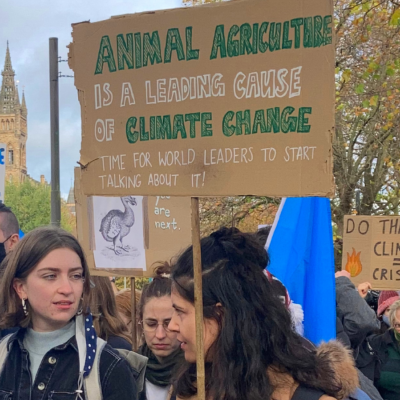Eating Better went to Glasgow, primarily, to support our alliance member, Nourish Scotland’s Recipes for Resilience programme. The twelve days of events at a venue in the shadow of the COP26 campus put the focus firmly on food and farming, providing a pavilion dedicated to exploring the many ways in which our food systems can be part of the solution to the challenges we face. The space, and the thoughtful and inclusive programme of events, plugged the gap that was missing at the official COP site, where food was not given a seat at the table despite, as we all know, our food systems being a major contributor to climate change and nature loss.
Pete Richie of Nourish Scotland said: “Food was still in the ‘too hard’ box for this COP - but with progress made on coal and carbon rules it will certainly be on the table at COP27.”

The Eating Better panel event at Nourish Scotland's Recipes for Resilience pavilion
Eating Better supported a number of the events on the programme as well as running our own event with screenings of our three new films - ‘Producing Better,’ ‘Serving Better’ and ‘Buying Better’ - a panel discussion and a networking event, which provided an opportunity to promote our “less and better” message and for new connections to be forged.
Simon Billing, executive director at Eating Better said: “The Recipes for Resilience events gave our alliance members the space and time to come together in person, to share ideas to make food part of the solution to the challenges we face. And to connect with new audiences in a way that’s just not possible in the virtual meeting room. We were very pleased to be there to highlight “less and better” meat and dairy, in production, procurement and food retail, through our panel event and screenings.”
Anna Taylor OBE, CEO of alliance member, the Food Foundation, said: "Although food systems weren’t given enough attention by the COP26 presidency, we were pleased to see so many food and climate organisations come together over the two weeks to create a dynamic set of events that illustrated the important role food has on impacting our climate. We also worked in close collaboration with WWF-UK to ensure our young food ambassadors could have their voices heard. The message is clear, we cannot meet 1.5 without changing our food systems.”
Eating Better’s networking event at the Recipe for Resilience pavilion
The fact that food wasn’t on the main agenda at COP26 didn’t hinder some significant announcements for farming and nature, namely pledges to cut methane and to halt and reverse deforestation by 2030. Our alliance member WWF-UK also secured further commitments from retail, demonstrating that food, and its impact on nature, matters.
On Nature Day of COP, five of the UK’s biggest retailers - Tesco, Sainsbury's, Waitrose, The Co-op and M&S - signed the “Retailers commitment for Nature,” pledging to play their part in supporting WWF’s goal to halve the environmental impact of UK shopping baskets by 2030, recognising in a joint statement that, “a future without nature is a future without food.” They also promised to set science-based targets for how they would help to reduce the UK food retail sector’s impact across climate, deforestation and nature, including tackling food waste and packaging.
Cathryn Higgs, Head of Food Policy at the Co-op said: “Just as Governments must be ambitious in delivering against their own commitments, we must all be bold and take collective action to tackle climate change. What we’d like to see is real engagement, with everybody in the food sector working together, a collaborative and inclusive process to accelerate change and make a difference.”
This commitment has been driven by WWF-UK, which has been working with Tesco since 2018 to develop the WWF Basket Metric, aiming to reduce the environmental impact of the average UK shopping basket by 50% and improve the sustainability of food, while ensuring it remains affordable for all. WWF-UK will measure and monitor retailers’ progress and the intention now is for other brands, across the sector, to follow suit.
Tanya Steele, CEO of WWF-UK said: "The promises these CEOs have made are game-changing and we hope other food retailers will follow in their footsteps, so that every shopper can be confident that the products they buy aren't fuelling the climate crisis and pushing precious wildlife closer to the brink.”
As the Eating Better roadmap outlines, setting targets and holding companies accountable is crucial to making progress. We’ve been calling for retailers to publish their animal protein sales and that any meat on offer should be produced to ‘better’ standards, as outlined in our Sourcing Better guide; the outcome of WWF’s basket is to have 100% meat, dairy and eggs sourced to ‘better’ standards by 2030.
Food businesses are taking the necessary steps to make change happen, recognising that aligning strategies and collaboration, across the sector, is key, but as COP26 has demonstrated there is still much to be done and we need change to happen at pace.
With COP behind us, we look now to the Food White paper, expected in the new year, to set a clear and ambitious path to a better food environment, which supports the health of people, nature and planet. However, the decisions and dialogues of the last fortnight have laid the groundwork for our food system to take its place at the table at COP27 in Egypt. And the food sector, including producers, pastoralists and indigenous communities, who travelled to Glasgow to be heard, must all be given a place, as part of a more inclusive agenda to make our food system, with all its diversity and complexity, part of the global solution to tackle climate change and nature loss.

